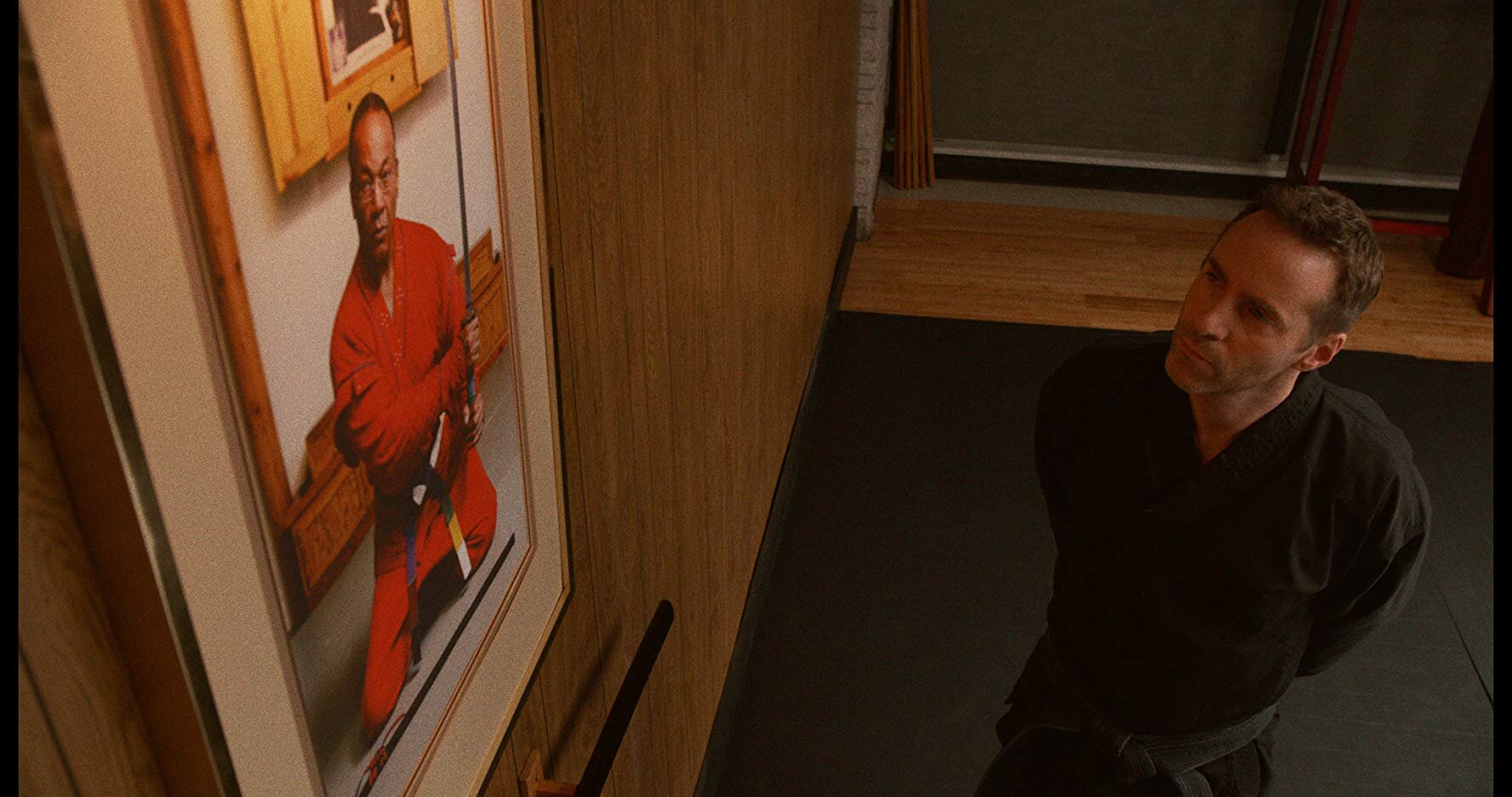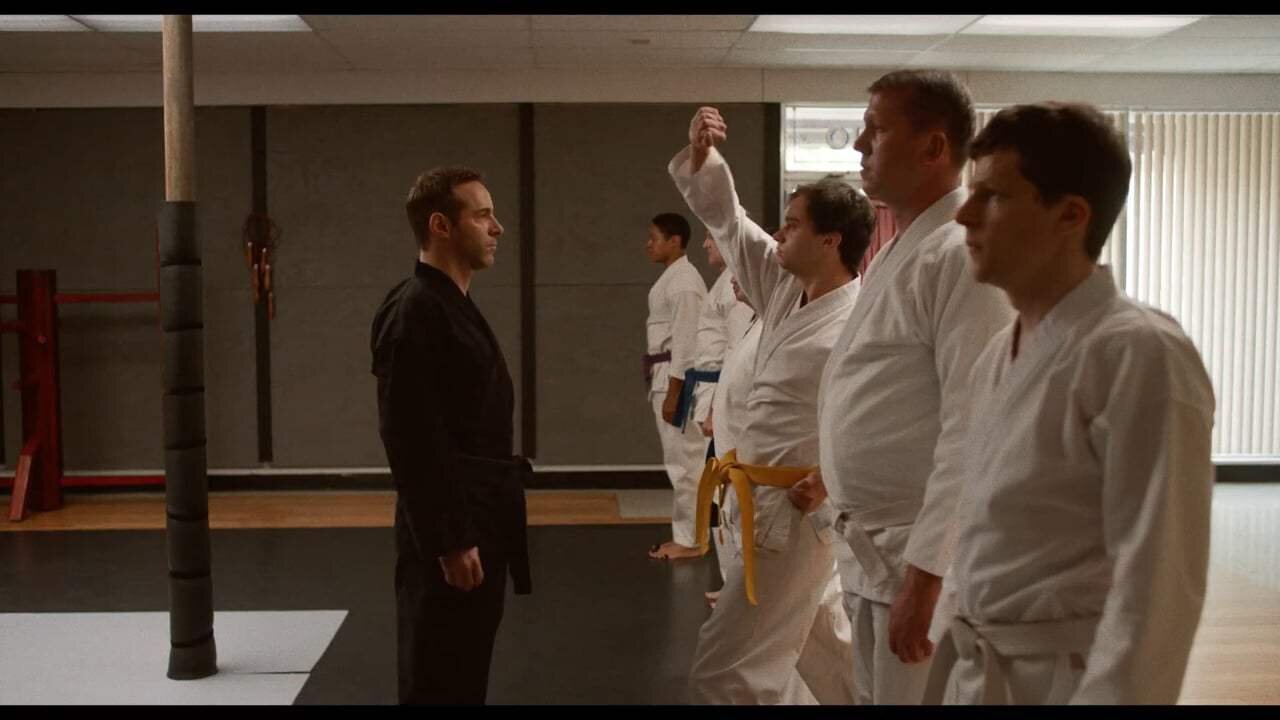Summary
After being brutally mugged, Casey Davies enrolls in a Karate course taught by an eccentric sensei.
My Thoughts:
The Art of Self Defense is the sophomore effort of Riley Sterns (director of “Faults”), and while it's not without its flaws, it's hard to believe that this was made by a Hollywood newcomer. It's a blend of surrealist black comedy, revenge thriller, and off-kilter romance all in one airtight package. While the humor might be too strange and deadpan for some casual viewers, it hit just the right spots for this to become a new cult classic in my eyes. It may have gotten overlooked at the time, but I'm sure as the years go by it's popularity will rise, and if it doesn't, that's a real shame because “The Art of Self Defense” is undeniably one of the strongest and quirkiest comedies of 2019.
The film follows Casey Davies (Jesse Eisenberg, “The Social Network”), a kiddish, rather effeminate man, that enjoys his silence and solitude almost as much as he enjoys his German Dodson. He's not one who looks for trouble, but a fateful moment occurs when Casey goes out for groceries and is attacked by a group of muggers who put him in the hospital and steal his wallet. I say fateful, of course, because that's what sends the story into motion: Casey decides to enroll in Karate after much deliberation and nearly becoming an agoraphobe. There he meets Sensei (Alessandro Nivola, “Face/Off”), a strange but welcoming man, one who ultimately holds a dark secret about Casey, but before it comes out he guides Casey through the corridors of martial arts.
There's a surreal separation from Casey's outside life and the life he takes on once he enters the karate dojo. The rules of the world are not the ones we are used to: in this dojo anything goes, whether it be breaking limbs, or blackmailing past clients, Sensei seems to be revered as a godlike figure. Played wonderfully by Nivola, Sensei brings a hysterically deadpan humor into the mix. He uses backhanded compliments like they're genuine, and uses very strange analogies to compare Casey's struggles to karate. Karate is also, hilariously portrayed as some sacred thing, as if it were constantly a life and death matter. Casey befriends the only female in the dojo, Ana (Imogen Poots, “Green Room”) who, when things start to get hairy, tells Casey in exhausted reverence that he should have never tried Karate, like it's something that cannot be undone.
This sort of surrealist comedy isn't going to hit with all audiences, and it's pretty mean spirited at points (like when Sensei breaks another member’s arm out of spite and kicks him out of class). But at the core is a strong message of owning one's masculinity, and how that term comes in many different definitions, not just set to one type of archetype. It also hits on misogyny too, and how even at a casual level it should not be tolerated, Sensei tells Casey that Ana will never get a black belt because she's a female, and obviously that ain't cool (Casey agrees that it isn’t cool). It's all the small nuances and irregularities in the dojo that finally push Casey to realize Sensei as the films antagonist. Each character feels wholly realized and unique; the writing specifically marred for that person, the craft and heart that went into this final product is evident in the filmmaking. I've always been a big fan of Eisenberg, I think his range is awesome, yet subtle despite some naysayers. His performance in this isn't so much awkward as it is uncomfortable, he plays a 35 year old (480 months?) who has yet to be comfortable in his own skin, and finally when the moment comes, he finds his purpose, and, not without drama and confrontation, his backbone.
Riley Stearns, despite being new to the Hollywood echelon, has written a superbly clever script, full of great characters and story beats, constantly subverting the audiences expectations in natural, and sometimes shocking ways (back to the breaking of the arm). About halfway through Sensei invites Casey to the night class, something that only the most serious members of the dojo are invited to. This night class is much less like the day time one, and much more like a Fight Club. Ana beats a man unconcious, and even still crushes his nose in while he's asleep, and it's all in the name of improving ones’ self. It's both macabre and hilarious, the way Stearns is able to navigate the comedy and the surreal with ease is quite impressive, and I can't wait to see what else he has to offer in the future. There's a nice little twist towards the end that sends Casey into full fledged revenge mode, tying together missing plot pieces along the way, to a climax that is both satisfying and funny, and one that doesn't linger more than it needs to, no schmaltz or useless epilogues, it ends when it needs to which is perfect, leaving the viewing wanting more of this kind of craft.
Verdict:
Overall The Art of Self Defense may prove to be a bit too strange and surreal for casual movie goers looking for a straightforward experience, but for those looking for a unique, very funny and at some points rather sinister film about a surreal karate dojo and one man's quest to find his own brand of masculinity, then this might just be for you. It's a strangely specific brand of film, but one whose different strokes often hit the right beats at the right times. Riley Stearns is proving to be a formidable new writer/director in Hollywood, with a razor sharp script that is constantly changing in a natural subversive way, to the characters who all exude their own likeness, from the arrogant but masterful Sensei, to Casey who finally finds his strength after he uncovers the Sensei's truth. On top of the weirdness there's a couple strong morality messages that aren't heavy handed and ties the whole film together nicely. The Art of Self Defense is a rare gem that should have gotten more recognition, it may not land with everyone, but it hit just the right black surrealist comedy bones for me, and I can't wait to see what else this new director has in store for the world.
I give The Art of Self Defense 4.5 stars out of 5.
Review Written By:





